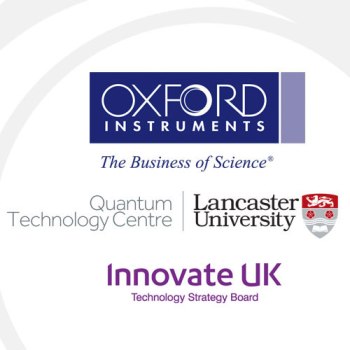Quantum technologies are poised to revolutionise our daily lives in the future, just as the semiconductor revolution did starting some fifty years ago. The UK Government has identified quantum technologies as a strategic area for investment, launching the £270 million ‘UK National Quantum Technologies Programme’ in its 2013 autumn statement.

Under the programme, Oxford Instruments and Lancaster University’s Quantum Technology Centre have been awarded a grant from Innovate UK, the UK Government’s innovation agency, for a project titled ‘Cryogen free Ultra Low Temperature Environments for Quantum Sensors (CUEQS)’.
The discoveries and development of quantum physics in the early 20th century transformed science and unlocked whole new generations of innovative and commercial technologies, giving us many new everyday devices based on semiconductors, lasers and laser diodes, and other applications that we now take for granted in our mobile phones and consumer products. Quantum technologies now carry the promise of enabling the next generation of sensors and detectors which exploit quantum effects even more directly – what has been described as ‘Quantum 2.0’.
Many quantum technologies will rely upon ultra low temperatures (close to absolute zero) to work. The CUEQS project will develop the concept designs for enhanced and practical quantum sensors, and the portable, cost-effective and user-friendly ultra low temperature environments that will make them usable. Together, these developments will form a foundation for applications such as higher resolution magnetic sensors that can be applied in a wide range of situations from environmental sensing to medical imaging.
Professor Yuri Pashkin, Director of Lancaster University’s Quantum Technology Centre commented, "This collaborative project will aid our understanding of innovative technologies, create essential new tools and components, and heralds a revolutionary era, as devices that harness the power of quantum mechanics have the potential to radically transform our lives.”
Paul Mason, Chief Scientific Adviser and Deputy Director of Research at Innovate UK said, “Quantum technology has the potential to become a major global industry, vital to the UK economy. By working together – universities, companies, Innovate UK, research councils and others – we will help to deliver a new breed of commercial devices that harness the awesome power of quantum physics, with significant and far-reaching impact to UK business and ultimately, the general public.”
“The devices developed in this project will significantly advance Oxford Instrument’s reputation as one of the world leaders in their sector. The miniaturisation and portability which is provided by these new devices greatly increases the commercialisation of quantum technologies, from quantum computers to single photon detectors, taking advanced sensors and instruments from the physics lab into our everyday lives”, Paul commented.
“Oxford Instruments is excited at the potential of developing the next generation of quantum technology tools and environments in association with such leading researchers at Lancaster University’s Quantum Technology Centre. We are building upon Oxford Instruments’ unique experience for over 55 years in low and ultra low temperatures and high magnetic field technologies to enable new innovative applications”, said Dr Ziad Melhem, Alliances Manager at Oxford Instruments NanoScience.